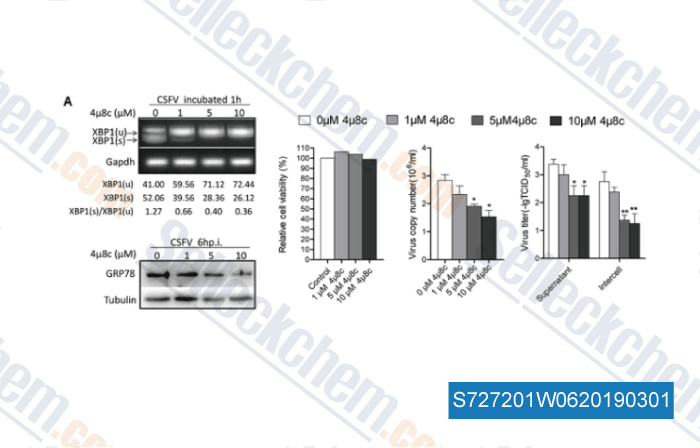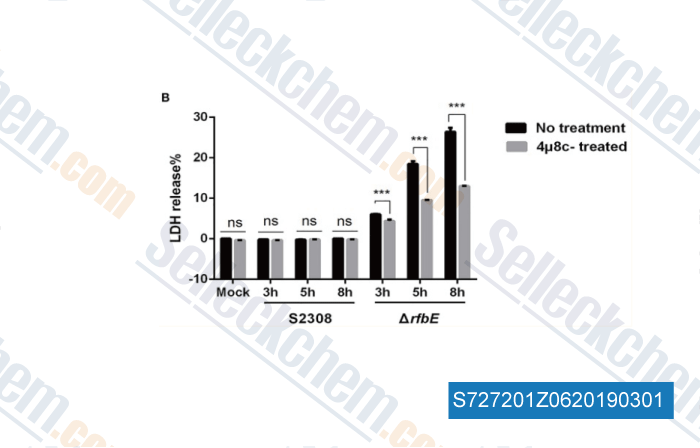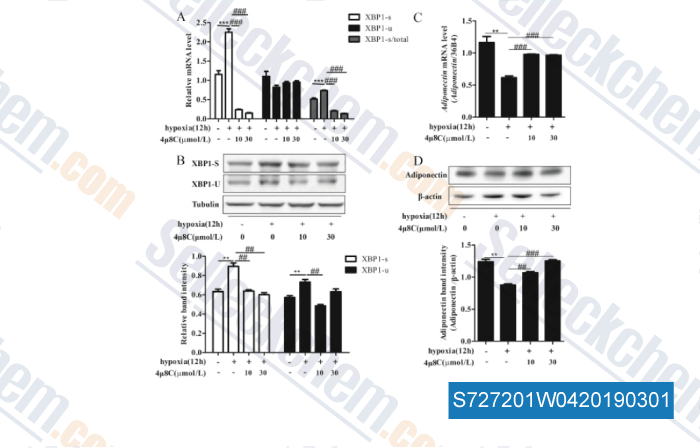|
Toll Free: (877) 796-6397 -- USA and Canada only -- |
Fax: +1-832-582-8590 Orders: +1-832-582-8158 |
Tech Support: +1-832-582-8158 Ext:3 Please provide your Order Number in the email. |
Technical Data
| Formula | C11H8O4 |
||||||||||
| Molecular Weight | 204.18 | CAS No. | 14003-96-4 | ||||||||
| Solubility (25°C)* | In vitro | DMSO | 71 mg/mL (347.73 mM) | ||||||||
| Water | Insoluble | ||||||||||
| Ethanol | Insoluble | ||||||||||
| In vivo (Add solvents to the product individually and in order) |
|
||||||||||
|
* <1 mg/ml means slightly soluble or insoluble. * Please note that Selleck tests the solubility of all compounds in-house, and the actual solubility may differ slightly from published values. This is normal and is due to slight batch-to-batch variations. * Room temperature shipping (Stability testing shows this product can be shipped without any cooling measures.) |
|||||||||||
Preparing Stock Solutions
Biological Activity
| Description | 4μ8C (IRE1 Inhibitor III) is a potent and selective IRE1 Rnase inhibitor with IC50 of 76 nM. | ||
|---|---|---|---|
| Targets |
|
||
| In vitro | 4μ8C blocks substrate(RIDD) access to the active site of IRE1 and selectively inactivates both Xbp1 splicing and IRE1-mediated mRNA degradation. IRE1 inhibition subsequently induces ER stress without measureable acute toxicity. [1] 4μ8C, as an IRE1 inhibitor, blocks IL-4, IL-5, and IL-13 production from CD4+ T cells. [2] |
||
| In vivo | 4μ8c is an IRE1 Inhibitor III that reduces atherosclerotic lesion and effectively mitigate plaque development in mice. |
||
| Features | IRE1 Rnase-selective inhibitor, used as a platform for developing new locally acting drugs. |
Protocol (from reference)
| Kinase Assay: |
|
|---|---|
| Cell Assay: |
|
| Animal Study: |
|
References
Customer Product Validation

-
Data from [Data independently produced by , , Free Radic Biol Med, 2018, 124:395-407]

-
Data from [Data independently produced by , , Front Microbiol, 2017, 8:2129]

-
Data from [Data independently produced by , , Front Cell Infect Microbiol, 2017, 7:422]

-
Data from [Data independently produced by , , Biochem Biophys Res Commun, 2017, 493(1):346-351]
Selleck's 4μ8C has been cited by 51 publications
| TMED4 facilitates regulatory T cell suppressive function via ROS homeostasis in tumor and autoimmune mouse models [ J Clin Invest, 2024, 135(1)e179874] | PubMed: 39480507 |
| MANF facilitates breast cancer cell survival under glucose-starvation conditions via PRKN-mediated mitophagy regulation [ Autophagy, 2024, 1-22.] | PubMed: 39147386 |
| HSP47 Increases the Expression of Type I Collagen in Fibroblasts through IRE1α Activation, XBP1 Splicing, and Nuclear Translocation of β-Catenin [ Cells, 2024, 13(6)527] | PubMed: 38534372 |
| Cetylpyridinium chloride triggers paraptosis to suppress pancreatic tumor growth via the ERN1-MAP3K5-p38 pathway [ iScience, 2024, 27(8):110598] | PubMed: 39211547 |
| Inhibition of IRE1α/XBP1 axis alleviates LPS-induced acute lung injury by suppressing TXNIP/NLRP3 inflammasome activation and ERK/p65 signaling pathway [ Respir Res, 2024, 25(1):417] | PubMed: 39604886 |
| KDELR2 is necessary for chronic obstructive pulmonary disease airway Mucin5AC hypersecretion via an IRE1α/XBP-1s-dependent mechanism [ J Cell Mol Med, 2024, 28(19):e70125] | PubMed: 39365189 |
| Ciprofloxacin is a novel anti-ferroptotic antibiotic [ Heliyon, 2024, 10(11):e32571] | PubMed: 38961954 |
| Alcohol promotes hepatocyte injury via ER stress sensor XBP1s mediated regulation of autophagy and lysosomal activity [ Toxicol Appl Pharmacol, 2024, 492:117117] | PubMed: 39362310 |
| A RIPK3-independent role of MLKL in suppressing parthanatos promotes immune evasion in hepatocellular carcinoma [ Cell Discov, 2023, 9(1):7] | PubMed: 36650126 |
| ER stress induces caspase-2-tBID-GSDME-dependent cell death in neurons lytically infected with herpes simplex virus type 2 [ EMBO J, 2023, e113118.] | PubMed: 37646198 |
RETURN POLICY
Selleck Chemical’s Unconditional Return Policy ensures a smooth online shopping experience for our customers. If you are in any way unsatisfied with your purchase, you may return any item(s) within 7 days of receiving it. In the event of product quality issues, either protocol related or product related problems, you may return any item(s) within 365 days from the original purchase date. Please follow the instructions below when returning products.
SHIPPING AND STORAGE
Selleck products are transported at room temperature. If you receive the product at room temperature, please rest assured, the Selleck Quality Inspection Department has conducted experiments to verify that the normal temperature placement of one month will not affect the biological activity of powder products. After collecting, please store the product according to the requirements described in the datasheet. Most Selleck products are stable under the recommended conditions.
NOT FOR HUMAN, VETERINARY DIAGNOSTIC OR THERAPEUTIC USE.
